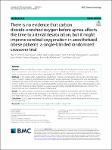Item Infomation
Full metadata record
| DC Field | Value | Language |
|---|---|---|
| dc.contributor.author | Marc T., Schmidt | - |
| dc.contributor.author | Marc, Studer | - |
| dc.contributor.author | Andres, Kunz | - |
| dc.date.accessioned | 2023-03-23T09:30:28Z | - |
| dc.date.available | 2023-03-23T09:30:28Z | - |
| dc.date.issued | 2023 | - |
| dc.identifier.uri | https://link.springer.com/article/10.1186/s12871-023-01982-9 | - |
| dc.identifier.uri | https://dlib.phenikaa-uni.edu.vn/handle/PNK/7110 | - |
| dc.description | CC BY | vi |
| dc.description.abstract | Carbon dioxide (CO2) increases cerebral perfusion. The effect of CO2 on apnea tolerance, such as after anesthesia induction, is unknown. This study aimed to assess if cerebral apnea tolerance can be improved in obese patients under general anesthesia when comparing O2/Air (95%O2) to O2/CO2 (95%O2/5%CO2). | vi |
| dc.language.iso | en | vi |
| dc.publisher | Springer | vi |
| dc.subject | The effect of CO2 on apnea tolerance | vi |
| dc.subject | cerebral apnea tolerance | vi |
| dc.title | There is no evidence that carbon dioxide-enriched oxygen before apnea affects the time to arterial desaturation, but it might improve cerebral oxygenation in anesthetized obese patients: a single-blinded randomized crossover trial | vi |
| dc.type | Book | vi |
| Appears in Collections | ||
| OER- Y học- Điều dưỡng | ||
Files in This Item:

